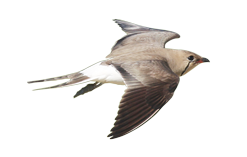Project objective
This European project, funded by the Horizon 2020 programme since October 2021 for a period of four and a half years, aims to demonstrate that large-scale coastal restoration can provide a low-carbon solution for climate adaptation and disaster risk reduction for threatened coastal systems, combined with biodiversity gains.

REST COAST brings together 37 organizations from 9 European countries, as well as Turkey and Israel, working on 9 pilot sites, including the Rhône Delta (Camargue), led by Tour du Valat.
In Camargue, the objective of the project is to restore 300 ha of coastal lagoons and 60 ha of saline scrubs, in parallel with the formation of new beach areas, targeting the following ecosystem services:
- Coastal erosion risk reduction
- Submersion risk reduction
- Water quality improvement

Actions & methodology
The implementation of the proposed actions for each of the nine pilot sites participating in the REST COAST project is based on the following methodology:
- Practical restoration of coastal ecosystems and scaling up of potential technical aspects
- Risk assessment based on coupled hydro-morpho-ecological models taking into account ecosystem services
- Reflection on the creation of innovative and sustainable financial packages
- Development of adaptation pathways through large-scale restoration
- Reflection on/adaptation of governance models
- Development of dissemination tools, valorization and social transformation
- Management and cooperation at European and international level
About REST-COAST
- Project’s website: https://rest-coast.eu/
Project videos:
Results
| Storm event measurement campaign in the South of the Rhône Delta’s pilot site – November/December 2023
In the final months of 2022, a major field campaign to measure wave and current dynamics during storm events was implemented south of the Rhône Delta pilot site. This campaign, mobilizing significant human and material resources, is part of an ongoing thesis financed by REST COAST and co-directed by Tour du Valat and CEREGE (Environmental Geosciences International Research and Teaching Centre/ Aix-Marseille University). The analysis of the measurements from the four instruments during the 3 weeks of deployment will provide local decision-makers with quantified information on the dynamics of the site during storms, and will allow a better understanding of the consequences of the restoration strategy on this dynamic. |
 |
Team
- Project leader: Olivier BOUTRON
- Project members: Loïc WILLM, Raquel AMBROSIO DE LA IGLESIA, Cécile PUIGSERVER, Marc THIBAULT, Hugo FONTES, Emilie LAURENT, Antoine GAZAIX, Morgane JOLIVET, Antoine ARNAUD, Samuel HILAIRE
- Team participating: Wetlands Dynamics and Water Management, Management and restoration of Natural and Agricultural ecosystems
- Projet duration: 2021-2026
Partners
Technical partners:
- https://rest-coast.eu/partners
- CEREGE (Environmental Geosciences International Research and Teaching Centre/ Aix-Marseille University)
- LEGI (Laboratoire des Écoulements Géophysiques et Industriels), Joint Research Unit (UMR 5519) of the Centre National de la Recherche Scientifique (CNRS), the Institut National Polytechnique de Grenoble (Grenoble INP) and the University Grenoble-Alpes (UGA)
Financial partners:
European Union’s Horizon 2020 Innovation Action under grant agreement No 101037097



